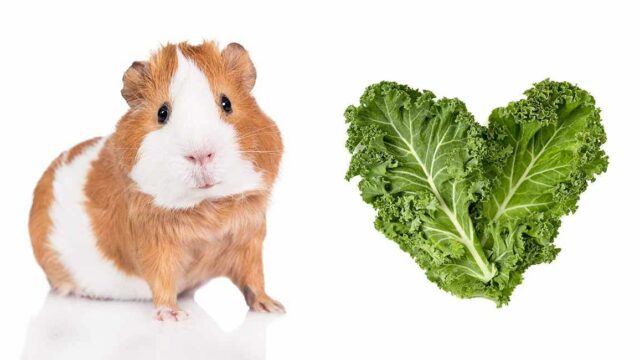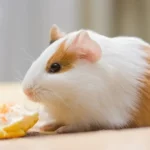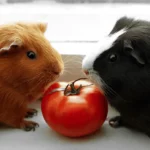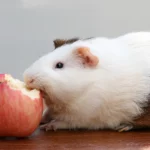Yes, Guinea pigs can eat kale but only in moderation due to high amounts of calcium.
Kale provides many health benefits for guinea pigs because it’s rich in vitamin C, vitamin A, fibers, and antioxidants but also at the same time low in calories and fat.
Do Guinea Pigs Like Kale?
Guinea pigs really do like kale and they like almost every greeny and leafy vegetable.
They will eat kale every time you give it to them because they find it is very delicious.
Can Guinea Pigs Eat Kale Daily?
Guinea pigs can’t daily eat kale due to the high levels of calcium.
If you feed your guinea pigs kale every day, then you will provide them with a lot of vitamin C which is good for their health.
But, there is a problem with calcium and bladder or kidney stones, so you shouldn’t give your guinea pig too much kale.
What are the Advantages of Kale to Guinea Pigs?
- Less Amount of Trans-Fat Every healthy food has fewer unsaturated fats which are known as trans-fat. They decrease the risk of obesity in guinea pigs. Less trans-fat makes blood vessels healthy, it’s good for the cardiovascular system
- Healthy Muscles and Efficient Metabolism Protein content in kale (2.92 gram per 100 gram) builds and maintains muscles. If your guinea pig’s daily protein need is fulfilled regularly, your pet will grow healthy muscles. Carbohydrates in kale (4.42 gram per 100 gram) can help your guinea pig to grow fast due to regulated metabolism by carbs.
- Prevents Constipation & Makes Intestines Healthy You should always make your gut clean and healthy because it’s known as the second brain of the body. Fibers in kale (1.49 gram per 100 gram kale) make the gut healthy by making healthy waste movement in the small as well as the large intestine.
- Strong Immunity Kale contains an ample amount of antioxidants like polyphenols, carotenoids, lutein, zeaxanthin, etc. along with vitamin C and Vitamin A makes strong defense against diseases. Thus, feeding your guinea pig kale gives it strong immunity.
- Quick Repair of Wound Vitamin K acts as a major coagulant in blood clotting and is present in kale. Feed your guinea pig kale regularly to prevent excessive loss of blood during any injury.
- Scurvy Preventions As guinea pigs cannot synthesize their Vitamin C on their own, an adequate quantity of vitamin C is a must to prevent scurvy. Scurvy can lead to frequent bleeding, exhaustion, red patches, and a decrease in fur on animals.
A good amount of healthy minerals like iron and magnesium are the two main healthy minerals present in kale.
Iron is a major component of oxygen transport in the blood. Magnesium improves hair growth and controls blood sugar levels.
Kale can prevent scurvy because of vitamin C content in it.
How much kale should I feed my guinea pig?
We should only feed one or two small leaves of Kale to our guinea pigs.
Always make sure you mix it with other low calcium veggies for proper balance.
Risk of Overfeeding Kale to Guinea pigs?
If served in excess, it can have some adverse effects on their health. Some of the most commonly noticed problems are:
- Stone Formation: Kale is rich in calcium and serving it regularly or in large quantities can lead to the formation of stones in guinea pigs. High-calcium food should be served sparsely and with a mix of other low-calcium food to avoid health issues.
- Bone pain & Rough Skin: Kale is also rich in Vitamin A, although Vitamin A is needed by guinea pigs; the excess of the same can lead to pain in the bones and rough skin in guinea pigs. If you serve too much kale to your guinea pigs it can lead to Vitamin A toxicity inducing these symptoms in your guinea pigs.
- Diarrhea and other digestive issues: Guinea pigs have a sensitive digestive system and frequent changes in diet or excessive feeding can lead to severe diarrhea and other digestive issues in guinea pigs. Always make sure you feed any food(except hay) in moderation to your guinea pigs.
- Abnormal Muscle Contraction: When guinea pigs are served high-potassium food(like kale) for a long time(or in large quantities) then they might suffer from abnormal muscle contraction. It can further lead to abnormal movement and other health issues in guinea pigs.
How often can guinea pigs eat kale?
Kale can be served 2-3 times a week to your guinea pigs.
Which Part of Kale is Best Suited for Guinea Pigs?
Guinea pigs eat almost all parts of kale such as leaves, stems, and flowers.
The best part is properly washing fresh kale stems and kale leaves.
The leaves are the most loved part of kale by guinea pigs and they are often known as the “Headquarters of nutrition”.
Kale leaves are low in fat, and high in vitamins, minerals, and fibers.
This is almost like “chocolate” to guinea pigs.
Guinea pigs also like kale stem as a food.
Kale stems are very good for the teeth because of their fibrous texture and tough and chewy nature.
Last, is kale flowers, guinea pigs find kale flowers very delicious and they eat them until all supplies are over.
If green kale is not available, guinea can also eat red kale, purple kale, white kale, black kale & curly kale.
Just make sure that kale is not cooked, instead, just serve them clean-washed kale.
Can Baby Guinea Pigs Eat Kale?
Yes, Baby guinea pigs can eat kale, but not immediately after birth.
They need milk from their mothers for the first 3 weeks. After that, you can introduce them to alfalfa hay and other foods such as kale.
Can Guinea Pigs Die After Eating Kale?
No, guinea pigs do not typically die after eating kale.
However, in very rare cases, the over-eating of kale causes death.






